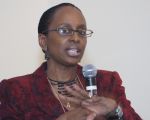The African-American faith community has traditionally been absent from efforts to fight the HIV/AIDS epidemic. The church’s message has ranged from the denial of the epidemic and how it is impacting the Black community to the vilifying and ostracizing of those infected.
 |
|
RENEE BEAMAN
|
However, through the work of organizations like Beautiful Gate Outreach Center in Wilmington, Del., this trend has turned in the opposite direction. The center, which is located in Bethel AME Church, works to eliminate the spread of HIV/AIDS and offers support for those with the disease.
“We give incentives,” said Executive Director Renee Beaman. “We give gifts for coming in, but once you come in, you’re mine. We’re going to educate you.”
Beaman was one of several speakers at a one-day conference at the Pittsburgh Theological Seminary regarding the Pittsburgh faith community’s response to HIV/AIDS in the African-American community. On May 13, in a room full of health care providers, clergy and other members of the faith-based community, she shared how Beautiful Gate fights to educate their community on HIV/AIDS and ensure those infected receive the necessary treatment and support.
Originating from an AIDS task force in 1994, Beautiful Gate now boasts a staff of more than 50, including three medical technicians, two registered nurses and a pharmacist. Beyond its many outreach initiatives, the center provides free testing and a number of support services including everything from treatment and counseling to food and clothing.
“We set up information booths in the restrooms; we give out condoms,” Beaman said. “I know some of you have issues with that, but I’m trying to keep people alive so I can teach them about Jesus.”
As the wife of Bethel AME’s pastor, Beaman said the attitudes of others in the faith community and especially those within her congregation can be difficult to navigate.
“Even though I’m the first lady and everybody loves me, some people just don’t like the HIV/AIDS ministry,” Beaman said. “Stigma and discrimination is much better than it was but we still have it.”
It is exactly this stigma that Anthony Anderson, project coordinator of the Partnership for Intervention and Empowerment, was trying to defeat when he came up with the idea for the conference.
“I had a vision about trying to bring the faith community into conference with the organizations,” Anderson said. “Everything that has been done successfully in the African-American community has been done through the church.”
There is an obvious conflict of interest for the faith-based community when it comes to HIV/AIDS and Anderson said the church would always advocate for abstinence. However, Anderson also said he would like to see the church lead the charge to force local government to play a larger role in the battle against HIV/AIDS.
“I’d like to see the church advocate for testing, especially for a marriage license. There’s no legislation that requires you to have an HIV/AIDS test before marriage,” Anderson said. “There are some other states and cities that are a little more progressive, but we are all still at the very beginning of this.”
One of the first faith-based initiatives addressing HIV/AIDS was the Balm in Gilead Inc., an organization that led the National Week of Prayer for the Healing of AIDS in 1989. Now in its 21st year, it is observed in Pittsburgh by several nonprofit and faith-based organizations.
“In the African-American community the church is the center,” said Dorcas Baker, site director, PA/Mid-Atlantic AIDS Education and Training Center. “We really didn’t address it in the early days and shamefully in 2010 we still don’t address it the way we should.”